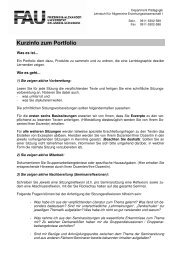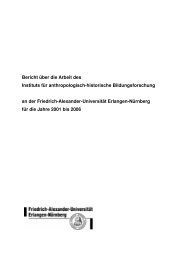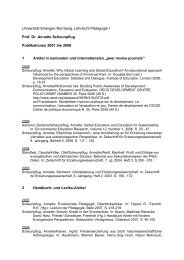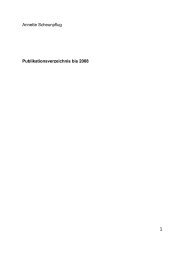ZEP - Lehrstuhl für Allgemeine Erziehungswissenschaft I
ZEP - Lehrstuhl für Allgemeine Erziehungswissenschaft I
ZEP - Lehrstuhl für Allgemeine Erziehungswissenschaft I
Erfolgreiche ePaper selbst erstellen
Machen Sie aus Ihren PDF Publikationen ein blätterbares Flipbook mit unserer einzigartigen Google optimierten e-Paper Software.
<strong>ZEP</strong>30. Jg. Heft 1 März 2007 Seite 13- provide evidence to DFID as to where and how developmenteducation contributes to their strategy on ‘BuildingSupport for Development’;- promote and encourage critical reflective engagementwith the meaning and effectiveness of development educationprogrammes with the educational community in the UK andinternationally;- develop a community of researchers engaged in developmenteducation;- develop a body of evidence through a series of publishedmonographs, academic articles and seminars on the contributiondevelopment education practice for building public supportand understanding of international development;- develop the first ever Masters degree course in the UK ondevelopment education aimed at NGO practitioners, teachersand educationalists;- develop and embed development education principlesand practices across teacher training and other educationalcourses and initiatives within the Institute of Education, andthereby in turn to other similar institutions.Support for the concept of the research centre came froma range of policy-makers and academics across Europe.Professor Annette Scheunpflug, from the University of Nurembergin Germany has written of the need for more sharingof thinking internationally as to the conceptual frameworkfor development education and global learning (Scheunpflug2004). In support for the Research Centre she has stated thefollowing: ‘The ongoing globalisation means challenge foreducation in general but in particular to all these educationalendeavours which deal with all efforts to educate for solidarityand justice in the one world. In all industrialised countrieswe can observe an educational scene coming from schoolpractice and NGOs which provides materials and ideas for globaleducation and learning for sustainability. In contrast thereare nearly no activities on research in this field. And if thereare some – for example as our existing work in Germany– they are focused in national perspectives not reflecting theinternational dimension of these learning challenges. Theresearch centre is an international answer to this deficiency’(Scheunpflug 2005).Ange Grunsell, former Head of Development Educationin Oxfam in the UK stated the following: ‘The progress ofDevelopment Education into mainstream policy and practicein this country is undoubtedly being held back by the absenceof a rigorous and substantive body of evidence as to howDevelopment Education methodology and content can raiseboth achievement and political participation. At Oxfam weidentified this in 2002 when we undertook a comprehensivereview in consultation with a range of external educationalistsand therefore identified the building a body of evidence as apriority strategic area. […] Only universities can provide thedevelopment of scholarship in this area, which will changeits image and its status and create a body of understandingabout teaching and learning through development education’(Grunsell 2005).Matt Smith from Northumbria University in UK stated:‘Despite being a significant element of their practice, there islittle research that focuses on NGOs’ development educationwork. The ways NGOs define and deliver development educa-Institute of Education of the University of London; Foto: http://ioewebserver.ioe.ac.uk.
















